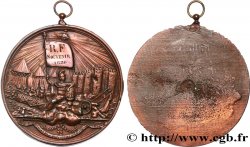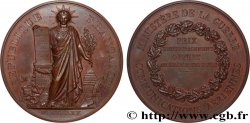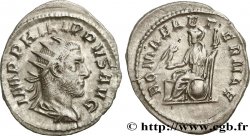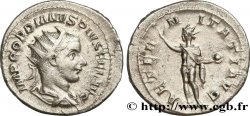v23_2010 - Essai de 40 Francs par Bazor n.d. Paris VG.5405
MONNAIES 23 (2004)
Starting price : 4 500.00 €
Estimate : 6 500.00 €
Realised price : 4 500.00 €
Number of bids : 1
Maximum bid : 8 215.00 €
Starting price : 4 500.00 €
Estimate : 6 500.00 €
Realised price : 4 500.00 €
Number of bids : 1
Maximum bid : 8 215.00 €
Type : Essai de 40 Francs par Bazor
Date: 1932-1935
Date: n.d.
Mint name / Town : Paris
Metal : silver
Diameter : 37,8 mm
Orientation dies : 6 h.
Weight : 27,31 g.
Edge : lisse
Rarity : R3
Coments on the condition:
Exemplaire superbe avec une très jolie patine de collection dans les champs. On ne note comme défaut que de minimes marques de manipulation dans le champ du revers et un très léger encrassement. La frappe de cet essai est très soignée avec un très bon centrage et des listels hauts et réguliers. Exemplaire d’une rareté insigne et d’un aspect splendide
Obverse
Obverse legend : + XPC O VINCIT O XP[C O REGNAT] O XPC O IMPERAT (EN CARACTÈRES ONCIAUX ET LÉGENDE QUI PASSE SOUS LE MOTIF).
Obverse description : Femme habillée d’un voile, agenouillée à gauche et tenant une monnaie, le tout sur fond quadrilobé avec fleurs de lis en cantonnement ; sur la ligne d’exergue LUCIEN BAZOR - PARIS 1932.
Obverse translation : (Le Christ règne, vainc et commande).
Reverse
Reverse legend : REPUBLIQUE FRANÇAISE// 1935.
Reverse description : Légende circulaire, au centre en trois lignes : 40/ FRANCS/ ESSAI.
Commentary
Un exemplaire dans la vente Jean Vinchon Numismatique du 7 octobre 2003 (6.486 euros réalisés avec les frais). Cet exemplaire est refrappé au revers sur le grand jeton de la Société Française de Numismatique, qui transparaît légèrement au-dessous. Le droit ne montre aucune trace de surfrappe ou de tréflage et a donc été parfaitement replacé dans le coin d’origine lors de la seconde frappe du revers.
A example in the Jean Vinchon Numismatique sale of October 7, 2003 (€6,486 realized including fees). This example is restruck on the reverse on the large token of the Société Française de Numismatique, which shows through slightly below. The obverse shows no trace of overstriking or plunking and was therefore perfectly replaced in the original die during the second strike of the reverse.
A example in the Jean Vinchon Numismatique sale of October 7, 2003 (€6,486 realized including fees). This example is restruck on the reverse on the large token of the Société Française de Numismatique, which shows through slightly below. The obverse shows no trace of overstriking or plunking and was therefore perfectly replaced in the original die during the second strike of the reverse.








 Report a mistake
Report a mistake Print the page
Print the page Share my selection
Share my selection Ask a question
Ask a question Consign / sell
Consign / sell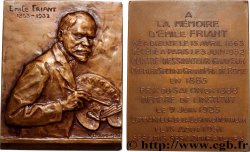
 Full data
Full data
